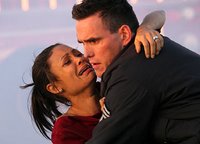 Response Paper: Crash
Response Paper: Crash
How the Movie Got “Racism” WrongThis movie breaks the conventional narrative mold by chopping up scenes abruptly and putting them in an order that doesn’t seem to make sense. We are taken from group to group with apparently no connecting threads to help us understand the juxtapositions. However, there seems to be a common theme that runs through each apparently nonsequitur episode. That unifying theme is one of shattering our preconceptions. Each scene sets up a situation in which is likely to elicit a certain judgment from the viewers about the characters and then utterly demolishes those judgments in subsequent scenes.

For example, the character played by Ludacris starts off decrying how unfair he is being treated because of his race, which is meant to elicit a certain feeling of sympathy from the viewer. But then, the movie utterly destroys that sense of sympathy as Ludacris robs an SUV with his accomplice.
Similarly, Matt Dillon’s character, the racist cop, is shown in a light that immediately makes the audience recoil in disgust at the way he pulled over the couple driving home from the awards ceremony.

But slowly we see Dillon struggle to help his sick father and we hear about how his father suffered at the hands of racists himself. And lastly, as Dillon pulls the character played by Thandie Newton out of the burning car, risking his own life, the viewer’s first impression of Dillon is undone. He is not just a one dimensional racist cop. His racism and personal ethics are more complicated and nuanced than one ugly label can convey.

This kind of set-up and knock-down of viewer preconceptions happens with almost every character in the movie. The heavily tattoo-ed locksmith is actually a hardworking, honest family man. The crazy Asian woman driver is actually a wife rushing to see her husband in the hospital. The poor car-struck Korean man is actually not worthy of our sympathy because he is a slave smuggler. The “unracist” cop played by Ryan Phillipe is actually much more racist than he himself even realized. And the callous detective played by Don Cheadle seemed to disrespect his mother. But in the end his partner and the viewer gets to see how horribly untrue that judgment really is.

If indeed the “message” of the movie is that we should put away our knee-jerk reactions and consider the ways in which they could be wrong, then I say this movie is not very helpful. I think that knee-jerk reactions are natural and beneficial to us as social creatures who must assess our environment and act properly within them. An intelligent Bayesian is simply acting on the undiscriminating statistics of what is most likely in any situation. Mistrusting a locksmith that looks like he has a lot of prison/gang tattoos is not a morally blameworthy thing to do. It is rational and logical. And if the statistics show that you are more likely to get robbed by two young black men than two young white men, then it is not wrong to fear robbery more when two young black men walk by than when white men walk by.
Racism is another creature entirely. Racism is a kind of value system that puts one race higher or lower than another for no other reason than their race. It is to say that one ethnicity is superior to another; one kind of human being is more valuable than another; and one race has more inherent worth than another. It is that kind of thinking that should be condemned; not rational acting based on statistical data.







